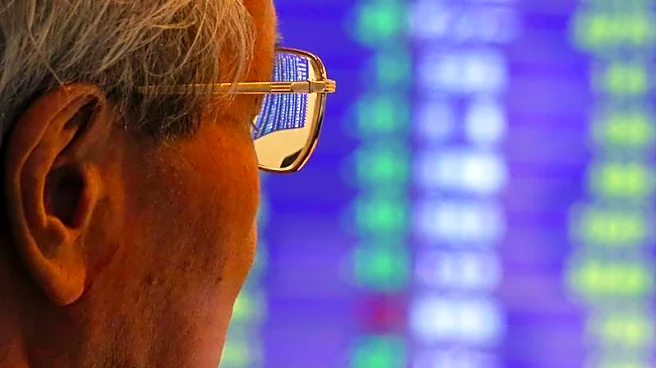By Kevin Buckland and Rocky Swift
TOKYO (Reuters) -Japanese government bond yields tested record highs on Tuesday after U.S. President Donald Trump's attempt to oust Federal Reserve Governor Lisa Cook, raising concerns about inflationary pressures under a potentially more dovish central bank.
The 30-year JGB yield returned to an all-time peak of 3.215%, matching Monday's top, tugged higher by a 5 basis point jump in similarly dated U.S. Treasury yields following Trump's announcement.
Long-dated Treasury
yields rose on expectations of higher inflation under a central bank that would prioritise support for the labour market over taming consumer prices, while short-term Treasury yields - which are more sensitive to the outlook for monetary policy - sank as much as 4 basis points.
The unprecedented highs for the longest-dated JGB yields complicate Tokyo's aim to rein in the developed world's biggest debt burden at around 250% of GDP. Finance Minister Katsunobu Kato said on Tuesday the ministry would closely monitor JGB market movements and pursue appropriate debt management.
Kyodo News reported that the ministry plans to request more than 32 trillion yen ($217.2 billion) for debt-servicing costs in the budget for the next financial year, a record amount.
"You can't sugarcoat it. It's not good," said Harry Ishikawa, an independent macro strategist and former adviser to Japan's Financial Services Agency. "The Ministry of Finance will try to cap it. They will tweak issuance or whatever to do that."
As the world's biggest creditor nation, with among the lowest sovereign yields globally, Japanese markets are highly vulnerable to interest rate moves in other markets.
Japan held $2 trillion of U.S. assets at the end of 2023, and that pile has been growing as returns on U.S. bonds rise. Japanese investors seeking better yields abroad and foreign investors locking in yen-carry trades have meant JGB yields move in virtual lock-step with Treasuries.
Cook's departure is not assured and she has disputed Trump's authority to remove her, responding in a statement that "no causes exists under the law".
Even so, Trump's attack on Cook ratchets up his campaign to exert more influence over the path of monetary policy, further knocking confidence in U.S. sovereign debt as a safe investment.
It is not a welcome development for a JGB market that has seen the longest-dated yields ticking to new highs on an almost daily basis recently, lifted not only by rising U.S. yields but concerns about a loosening of fiscal discipline at home.
The ruling coalition's thumping defeat in upper house elections last month ceded more influence to opposition parties promoting deficit-funded consumption tax cuts.
Prime Minister Shigeru Ishiba's refusal to resign has also raised concerns that discussions on a supplementary budget could be delayed.
"It's inevitable that yields will keep edging higher if there are no buyers, and there are no investors right now who are willing to buy 30-year JGBs," said Shoki Omori, chief desk strategist at Mizuho Securities.
"If there are expectations that the Fed is going to let inflation go, there's going to be pressure on long-end U.S. yields to rise, and that's going to exert pressure globally," Omori added.
"The Fed doesn't look like an independent organisation anymore."
($1 = 147.3300 yen)
(Reporting by Kevin Buckland and Rocky Swift; Editing by Jacqueline Wong)
















